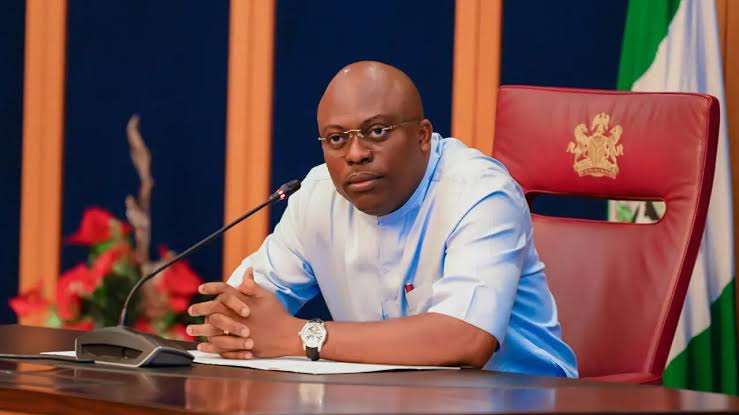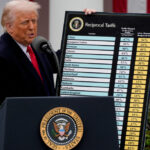Eleven governors from the Peoples Democratic Party (PDP) have taken President Bola Tinubu and the National Assembly to the Supreme Court of Nigeria, contesting the controversial six-month suspension of Rivers State Governor Siminalayi Fubara.
It was gathered that this high-stakes case, filed under suit number SC/CV/329/2025, is challenging the constitutional powers of the President to suspend a democratically elected governor and impose a state of emergency.
The plaintiffs in the suit are – Adamawa, Enugu, Osun, Oyo, Bauchi, Akwa Ibom, Plateau, Delta, Taraba, Zamfara, and Bayelsa states.
The legal battle stems from Tinubu’s March 18, 2025, declaration of a state of emergency in Rivers State, a decision that led to the suspension of Fubara, his deputy Ngozi Odu, and all elected members of the Rivers State House of Assembly.
Citing political instability in the oil-rich state, Tinubu appointed retired Vice Admiral Ibok-Ete Ibas as Sole Administrator to oversee governance during the six months.
The National Assembly subsequently ratified the President’s actions, sparking widespread debate over the constitutionality of the move.
Weeks after the development, PDP governors have now approached the Supreme Court over the suspension of one of their own.
The PDP governors argued that this suspension violates the 1999 Constitution of Nigeria (as amended), asserting that the President lacks the authority to unilaterally suspend elected state officials and replace them with an unelected administrator.
The plaintiffs, representing Adamawa, Enugu, Osun, Oyo, Bauchi, Akwa Ibom, Plateau, Delta, Taraba, Zamfara, and Bayelsa states, are seeking a Supreme Court ruling to nullify the suspension and restore Fubara’s administration.
The suit, filed through the states’ Attorneys General, is grounded on eight legal points, primarily questioning the scope of presidential power under Sections 1(2), 5(2), 176, 180, 188, and 305 of the Constitution.
They further prayed the court to determine the following: “Whether upon a proper construction and interpretation of the provisions of Sections 1(2), 5(2), 176, 180, 188 and 305 of the Constitution of the Federal Republic of Nigeria 1999, the President of the Federal Republic of Nigeria can lawfully suspend or in any manner whatsoever interfere with the offices of a Governor and the Deputy Governor of any of the component 36 States of the Federation of Nigeria and replace same with his unelected nominee as a Sole Administrator, under the guise of, or pursuant to, a Proclamation of a State of Emergency in any of the State of the Federation, particularly in any of the Plaintiffs States?
“Whether upon a proper construction and interpretation of the provisions of Sections 1(2), 4(6), 11(4) & (5), 90, 105 and 305 of the Constitution of the Federal Republic of Nigeria 1999, the President of the Federal Republic of Nigeria can lawfully suspend the House of Assembly of any of the component 36 States of the Federation of Nigeria, under the guise of, or pursuant to, a Proclamation of a State of Emergency in any of such States, particularly in any of the Plaintiffs States?
“Whether the consequent threat by the first Defendant acting on behalf of the President to the States of the Federation, including the Plaintiffs’ States, to the effect that the offices of the Governor and Deputy Governor of the States can be suspended by the President by virtue of a Proclamation of a State of Emergency, is not in contravention of the provisions of Sections 1(2), 4(6), 5(2), 11(2) and (3) of the Constitution of the Federal Republic of Nigeria 1999 and inconsistent with the principles of constitutional federalism?”
Meanwhile, the respondents in the suit are to, within 14 days after the service of the Summons on them, inclusive of the day of such service, cause an appearance to be entered for them.





